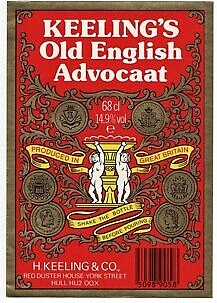Advocaat
Not a lawyer, even in Holland, unless she has got so far through the booze cabinet that all is left is egg brandy.
|
People Anatomy™
A spotter’s guide to the men and women of finance.
|
Advocaat is a dun-coloured dutch liqueur made from a blend of hen egg yolks, aromatic spirits, sugar, and brandy. You might think a mildly alcoholic drink that looked like puss would be something you’d try once, in the nineteen seventies, in Amsterdam, and would now exist only in nostalgia shows, but somehow it has survived and you can buy it, even in Tesco, to this very day.
Once upon a time — in fairness, it was the seventies — it was so popular in Yorkshire that it generated litigation so powerful that it developed the modern law of passing windoff.
In Erven Warnink BV v J Townend & Sons (Hull) Ltd [1979] AC 731, Townend, from Hull, basically ripped off Advocaat creating a tipple he called “Keeling’s Old English Advocaat”, only using normal eggs and wine from Cyprus wine.
How something called “advocaat” counts as “Old English” is a fit subject for a short debate. If he’d called it “Keeling’s Old English Advocate” (a) he might have got away with it, and (b) might have shifted a few units to people mistaking it for some kind of microbrewed beer. I rather like the sound of a pint of Keeling’s Old English Advocate, and sorely regret there isn’t one to be had.
In any case, if you are like me you will have just executed a double take, for if common sense and logic drove the market, surely Mr Townend’s fate would be the kind survivor bias fails to take account, and the legal world would remain somewhat muddled about the limits of a passing off action.
But no: seemingly the people of East Riding acquired a taste for Townend’s sludge. This came to the attention of a Mr. Warnink, of Holland, who owned the Advoccat trademark. Mr Warnink took to the courts, eventually finding Lord Diplock in the Court of Appeal. There was no trademark infringement as such, but it was close. Mr Warnink this brought his action for the hitherto obscure common law tort of “passing off”.
In finding for the Dutchman, the court established five criteria for a claim of “extended” passing off. There must be (1) a misrepresentation, made (2) by a trader in the course of trade, (3) to prospective consumers of his goods or services, which is both (4) calculated[1] to injure the business or goodwill of another merchant, and (5) in fact actually does so.
This has subsequently been simplified a bit, but not in amusing circumstances, so if you want to know more about that, you’ll have to Google it. Reckitt & Colman Products Ltd v Borden [1990] 1AllER 893
See also
References
- ↑ i.e., likely.
